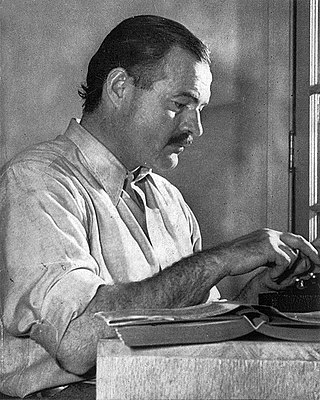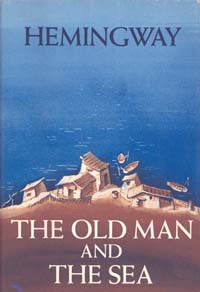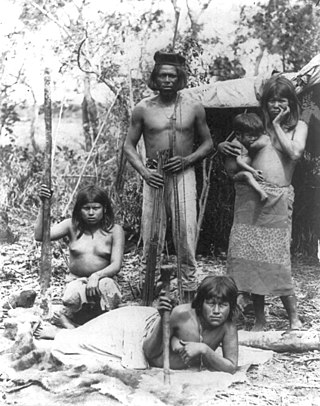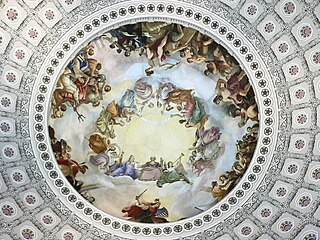
Ernest Miller Hemingway was an American novelist, short-story writer and journalist. Best known for an economical, understated style that significantly influenced later 20th-century writers, he is often romanticized for his adventurous lifestyle, and outspoken and blunt public image. Most of Hemingway's works were published between the mid-1920s and mid-1950s, including seven novels, six short-story collections and two non-fiction works. His writings have become classics of American literature; he was awarded the 1954 Nobel Prize in Literature, while three of his novels, four short-story collections and three nonfiction works were published posthumously.
Individualism is the moral stance, political philosophy, ideology and social outlook that emphasizes the intrinsic worth of the individual. Individualists promote realizing one's goals and desires, valuing independence and self-reliance, and advocating that the interests of the individual should gain precedence over the state or a social group, while opposing external interference upon one's own interests by society or institutions such as the government. Individualism makes the individual its focus, and so starts "with the fundamental premise that the human individual is of primary importance in the struggle for liberation".

Leisure has often been defined as a quality of experience or as free time. Free time is time spent away from business, work, job hunting, domestic chores, and education, as well as necessary activities such as eating and sleeping. Leisure as an experience usually emphasizes dimensions of perceived freedom and choice. It is done for "its own sake", for the quality of experience and involvement. Other classic definitions include Thorstein Veblen's (1899) of "nonproductive consumption of time." Free time is not easy to define due to the multiplicity of approaches used to determine its essence. Different disciplines have definitions reflecting their common issues: for example, sociology on social forces and contexts and psychology as mental and emotional states and conditions. From a research perspective, these approaches have an advantage of being quantifiable and comparable over time and place.
Communitarianism is a philosophy that emphasizes the connection between the individual and the community. Its overriding philosophy is based on the belief that a person's social identity and personality are largely molded by community relationships, with a smaller degree of development being placed on individualism. Although the community might be a family, communitarianism usually is understood, in the wider, philosophical sense, as a collection of interactions, among a community of people in a given place, or among a community who share an interest or who share a history. Communitarianism usually opposes extreme individualism and rejects extreme laissez-faire policies that deprioritize the stability of the overall community.

Mores are social norms that are widely observed within a particular society or culture. Mores determine what is considered morally acceptable or unacceptable within any given culture. A folkway is what is created through interaction and that process is what organizes interactions through routine, repetition, habit and consistency.

The Old Man and the Sea is a 1952 novella written by the American author Ernest Hemingway. Written between December 1950 and February 1951, it was the last major fictional work Hemingway published during his lifetime. It tells the story of Santiago, an aging fisherman, and his long struggle to catch a giant marlin. The novella was highly anticipated and was released to record sales; the initial critical reception was equally positive, but attitudes have varied significantly since then.

Personal life is the course or state of an individual's life, especially when viewed as the sum of personal choices contributing to one's personal identity.
Lifestyle is the interests, opinions, behaviours, and behavioural orientations of an individual, group, or culture. The term was introduced by Austrian psychologist Alfred Adler in his 1929 book, The Case of Miss R., with the meaning of "a person's basic character as established early in childhood". The broader sense of lifestyle as a "way or style of living" has been documented since 1961. Lifestyle is a combination of determining intangible or tangible factors. Tangible factors relate specifically to demographic variables, i.e. an individual's demographic profile, whereas intangible factors concern the psychological aspects of an individual such as personal values, preferences, and outlooks.

The Theory of the Leisure Class: An Economic Study of Institutions (1899), by Thorstein Veblen, is a treatise of economics and sociology, and a critique of conspicuous consumption as a function of social class and of consumerism, which are social activities derived from the social stratification of people and the division of labor; the social institutions of the feudal period that have continued to the modern era.

Robert Neelly Bellah was an American sociologist and the Elliott Professor of Sociology at the University of California, Berkeley. He was internationally known for his work related to the sociology of religion.
Herbert J. Gans is a German-born American sociologist who taught at Columbia University from 1971 to 2007.

American civil religion is a sociological theory that a nonsectarian religious faith exists within the United States with sacred symbols drawn from national history. Scholars have portrayed it as a common set of values that foster social and cultural integration. The ritualistic elements of ceremonial deism found in American ceremonies and presidential invocations of God can be seen as expressions of the American civil religion.

The sociology of leisure or leisure sociology is the study of how humans organize their free time. Leisure includes a broad array of activities, such as sport, tourism, and the playing of games. The sociology of leisure is closely tied to the sociology of work, as each explores a different side of the work-leisure relationship. More recent studies in the field move away from this relationship, however, and focus on the relation between leisure and culture.
Sheilaism is a shorthand term for an individual's system of religious belief which co-opts strands of multiple religions chosen by the individual usually without much theological consideration. The term derives from a woman named Sheila Larson, who is quoted by Robert N. Bellah et al. in their book Habits of the Heart as following her own "little voice" in a faith she calls "Sheilaism".

Pragmatic ethics is a theory of normative philosophical ethics and meta-ethics. Ethical pragmatists such as John Dewey believe that some societies have progressed morally in much the way they have attained progress in science. Scientists can pursue inquiry into the truth of a hypothesis and accept the hypothesis, in the sense that they act as though the hypothesis were true; nonetheless, they think that future generations can advance science, and thus future generations can refine or replace their accepted hypotheses. Similarly, ethical pragmatists think that norms, principles, and moral criteria are likely to be improved as a result of inquiry.
Settler society is a theoretical term in the early modern period and modern history that describes a common link between modern, predominantly European, attempts to permanently settle in other areas of the world. It is used to distinguish settler colonies from resource extraction colonies. The term came to wide use in the 1970s as part of the discourse on decolonization, particularly to describe older colonial units.

Otium is a Latin abstract term which has a variety of meanings, including leisure time for "self-realization activities" such as eating, playing, relaxing, contemplation, and academic endeavors. It sometimes relates to a time in a person's retirement after previous service to the public or private sector, as opposed to "active public life". Otium can be a temporary or sporadic time of leisure. It can have intellectual, virtuous, or immoral implications.
Ann Swidler is an American sociologist and professor of sociology at the University of California, Berkeley. Swidler is most commonly known as a cultural sociologist and authored one of the most-cited articles in sociology, "Culture in Action: Symbols and Strategies".
Richard Madsen is distinguished Professor of Sociology the University of California, San Diego, specializing in sociology of China.
Shakespeare and Company was an influential English-language bookstore in Paris founded by Sylvia Beach in 1919; Beach published James Joyce's 1922 novel Ulysses at the bookstore. The store closed in 1941.










